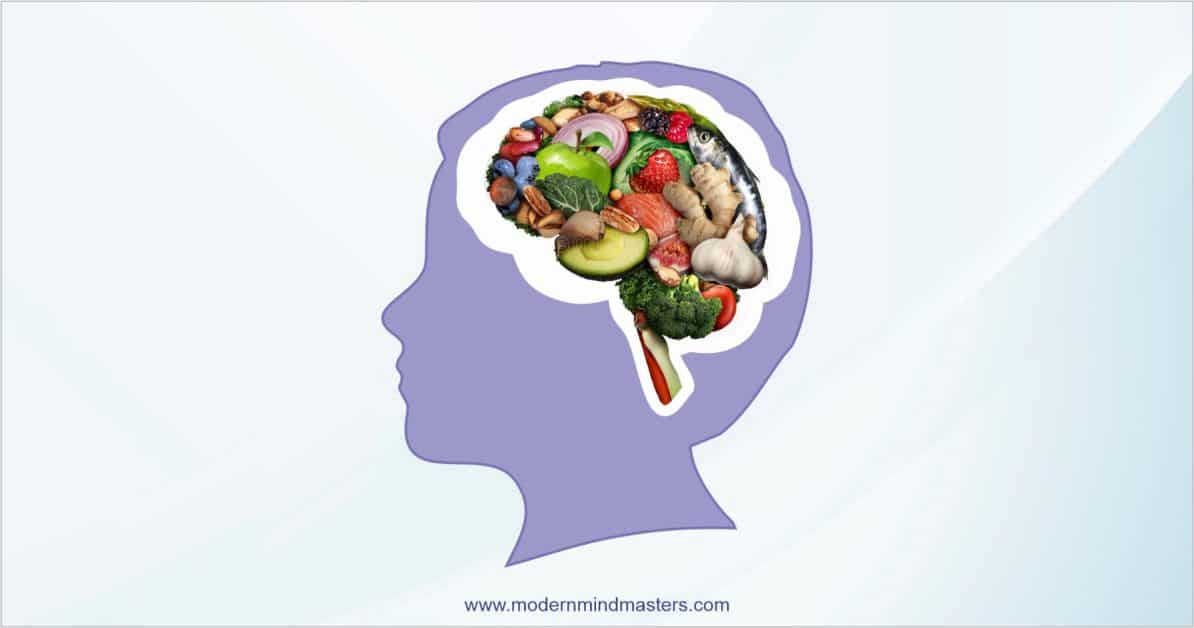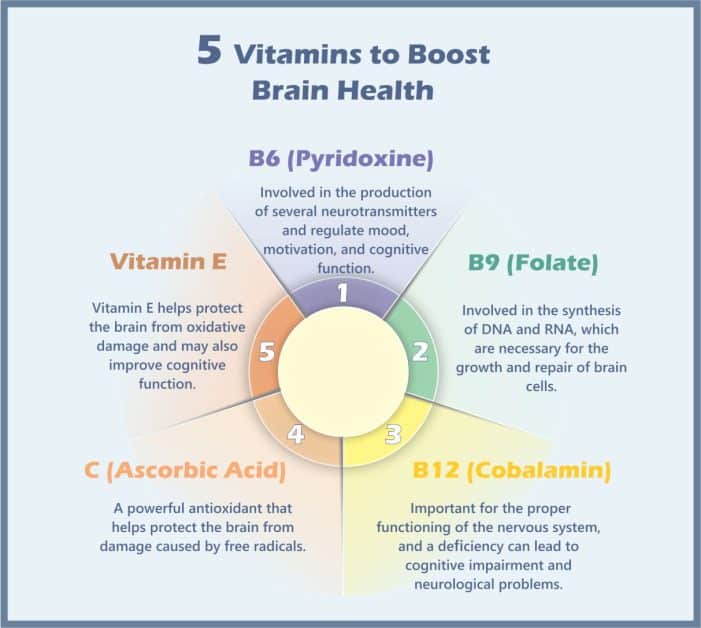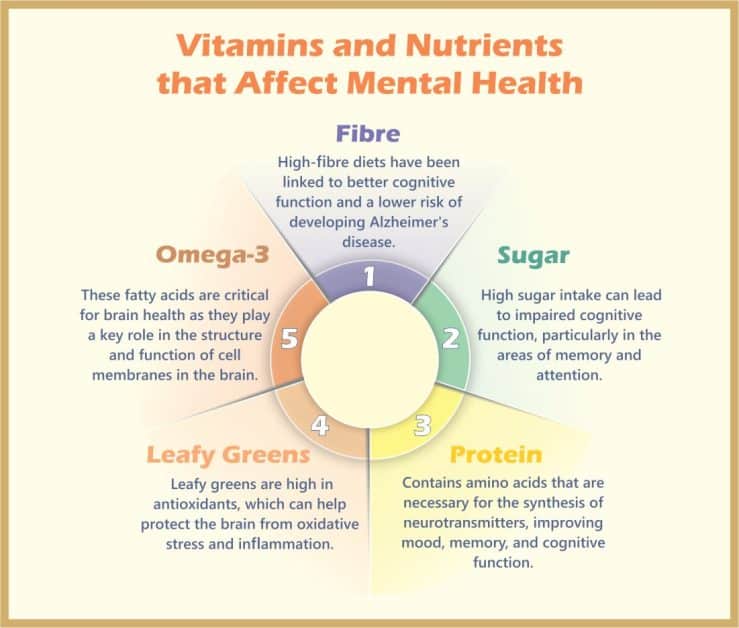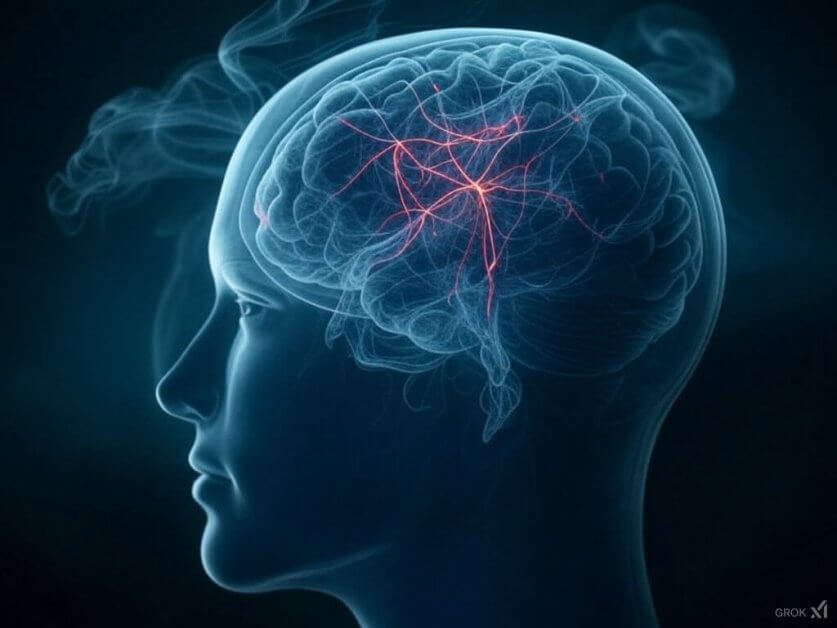Nutritional Psychiatry – Foods the Brain Needs for Success
Key Points:
- The brain has its own nutritional requirements for optimum health and performance.
- Lacking just one significant nutrient can result in mental conditions such as depression, anxiety, and stress.
- B-vitamins, omega-3, antioxidants, magnesium, and iron are 5 commonly lacking nutrients that may boost your metal health.

Your body is your temple. What you feed it, therefore, determines your overall health, mobility, and ability to remain active as you age.
We know the importance of monitoring our calorie intake to avoid obesity and its associated ailments (obesity accounts for 80-85% of the risk of developing type 2 diabetes). We endeavor to eat five portions of fruit and vegetables daily to fuel our body with the nutrients it needs to survive and prosper.
But what about the brain? Often thought of as more of a mental phenomenon, the brain represents one of the largest internal organs, second only to the liver.
Despite accounting for just 2% of the body’s mass, the brain consumes 20% of its energy. Fueling it sufficiently with the vast amounts of nutrients required, therefore, plays a crucial role in the brain’s composition, structure, and function, determining both your health and happiness.
This article will delve into the importance of nourishing the brain through the foods we consume, and what simple changes you can make to your diet today for a healthier and happier you.
Nutritional Psychiatry
With mental-health disorders rising, scientists are increasingly investigating how food and nutritional supplements affect the brain. While the physical effects on the body are well-documented and understood, the complexities of the brain have left this field neglected.
Enter the rapidly emerging science of nutritional psychiatry. While still in its infancy, this exciting field is attempting to reveal the significant effects of our diet on the performance and health of the brain.
Brains, being the most complex and energy-demanding of the body’s organs, almost certainly have their own specialized nutritional needs. While some things are obvious (more natural and less processed foods), other requirements are far more subtle.
Mental Health is a Complex Field
While it may seem obvious that our diet affects the brain and mental health, the determining factors are complex, and correlations difficult to make.
Over the past few years, however, increasing evidence indicates strong associations between a poor diet and the worsening of mood disorders such as anxiety, depression, and other neuropsychiatric conditions.
Data predicts that the burden of mood disorders and stress-induced mental vulnerabilities will continue to rise globally over the coming decades. It is therefore imperative that this issue is addressed aggressively, reducing the mental burdens induced by poor diets.
Depression
Of particular interest to nutritional experts and psychologists is the role of depression in mental health. Of the multiple studies conducted on the issue, nutritional deficiencies are commonly associated with increased depression.
A lack of vitamin C (involved in converting dopamine to noradrenaline), for example, was found to relate to higher levels of depression.
Additionally, these studies found correlations between a lack of vitamin D causing both depression and ADHD
While much work is still needed to prove the possibility of depression as a result of nutritional deficiencies, there is an overwhelming burden of proof that an increased intake of a “healthy diet”, defined as a diet high in fruit, vegetables, fish, and whole grains, is associated with a reduced likelihood of depression.
The Nutritional Effects on Neurotransmitters
Serotonin is a neurotransmitter, a chemical messenger in the brain that performs many vital functions, many of which significantly affect mental health.
Amongst its many roles, serotonin is vital for mood regulation; it is often referred to as the feel-good neurotransmitter because it is involved in the fundamental functions that make us “feel good”, such as a healthy appetite and sleep.
It is not surprising that the digestive system has a significant impact on mood, given that the gastrointestinal tract contains hundreds of millions of nerve cells (neurons) and is responsible for producing nearly 95% of the body’s serotonin.
It is not just serotonin that is heavily influenced by diet; other neurotransmitters such as dopamine, responsible for controlling feelings of pleasure and reward, are also heavily dependent on the pools of available nutrients.
The conversion of tryptophan to serotonin alone requires vitamin B6, iron, phosphorus, and calcium. A deficiency in just one of these will affect the entire conversion process, limiting your potential to be happy.
Forget Recommended Daily Allowance
One way people attempt to improve the health of the body and brain is to ensure they hit their recommended daily allowances (RDA) in their diet.
While well-intentioned, successive research has shown RDA guidelines to be outdated at best. Formulated for the physical health of troops during the Second World War, they are too vague to be useful for the majority of people, especially given the significant variations in age, size, and activity.
For example, the US RDA for calcium is 1,000 mg but only 600 mg in Japan. The US RDA for vitamin E is 15 mg while only 4 mg is recommended in the UK.
In any case, there are no such RDA recommendations for the brain – not yet, at least. So while hitting your RDAs certainly won’t hurt, it is not the be-all and end-all of nutritional completeness.
We Don’t Get Enough of the Good Stuff
Between the convenience of fast food, the recent price increases of healthy fresh fruits and vegetables, and the simple lack of understanding about the importance of nutrition, it is little surprise that a vast majority of people are lacking in one or more nutrients.
Only 10% of adults in America consume their recommended daily serving of vegetables. While vitamin D and omega-3 are the main culprits alluding most diets, fiber, calcium, and iron are also priority suspects missing for the majority.
Supplements
As a result, many turn to vitamin and mineral supplements to make up for their dietary deficiencies.
A large randomized control trial published in September showed that daily multivitamin supplementation may improve cognitive function in individuals over 65. The study followed over 2,000 people and estimated that three years of taking a daily multivitamin led to a 60% decrease in the rate of cognitive decline.
Vitamins
Just as ingredients are the building blocks of a recipe, nutrients play a similarly crucial role in maintaining the health and function of the brain where they all work together to create a well-rounded recipe, or in this case, support healthy brain function.
Just as a recipe can be impacted by a missing or inadequate ingredient, a lack of essential nutrients, such as vitamins and minerals, will negatively affect brain health.
Although all nutrients contribute in some specific manner to brain health, key nutrients essential for healthy neurodevelopment include protein, iron, folate, iodine, iron, and vitamins A, B6, B12, and D.
Similarly, a 2016 study showed how deficiencies of various nutrients, primarily vitamins, impair cognition.
One such correlation was a lack of vitamin B12 (found in animal-derived foods and fortified cereals) with increased fatigue, depression, lethargy, and poor memory.
A lack of vitamin B1 (thiamine) was found to affect the central nervous system (CNS), with sensations of numbness. Similarly, a lack of vitamin B9 (folic acid), was found harmful to neurodevelopment in utero and infancy, also correlating with a greater risk of depression during adulthood.
On the flip side, increased vitamin D has been associated with better attention and working memory in adults aged 65 years and over.

Natural Unprocessed Foods
You don’t need another blog forcing the importance of eating natural and unprocessed foods down your throat, but allow me to show you the benefits of such a diet as shown by numerous studies.
This study, consisting of eight cohort studies, linked a reduced risk of depression with adherence to the Mediterranean diet, a diet defined as high in vegetables, fruit, pulses, and whole grains and low in red and processed meats and saturated fats.
The list of benefits included a decrease in the chances of experiencing strokes, cognitive impairment, and depression. Other studies on this diet have found a reduction in age-related atrophy, likely a result of higher concentrations of polyphenols (antioxidants).
While it may sound like a no-brainer, scientists believe such diets work by reducing inflammation in the brain, affecting areas such as the hippocampus (associated with learning, memory, and mood regulation).
Studies in animals show a diet rich in omega-3 fatty acids (walnuts), flavonoids (tea, wine), antioxidants (berries), and resveratrol (red grapes) can stimulate neuron growth and reduce inflammation.
This supports research linking a regular diet of processed, fried, and sugary foods, which increase brain inflammation, to an increased risk of depression.
The benefits of such a diet extend past a decreased risk of depression. A higher diet quality in adult life has been associated with a reduced risk of cognitive decline, and another study showed that a Mediterranean diet supplemented with olive oil and nuts was associated with improved cognitive function in an older population.
Microbiomes
One intriguing scientific development of recent years is the role of gut microbiomes on the functions of the brain.
The gut microbiome refers to the community of microorganisms living in the digestive tract that play a role in digestive, metabolic, and immune processes and impact overall health. Research increasingly shows that these microorganisms living in the gut act as intermediaries between food and the brain.
The gut microbiome forms a complex ecosystem, which can be easily upset when any micronutrients are lacking.
When the sorts of microorganisms found in yogurt and fermented foods are missing, for example, trials have shown a corresponding increase in anxiety. Dr. Ted Dinan, a professor of psychiatry at University College, Cork has written about how a person’s capacity to deal with stress can be significantly altered by a single strain of bacterium in the gut.
More specifically, the two species Bifidobacterium and Lactobacillus were found to reduce stress on trial mice, suggesting that, when ingested, some types of gut microorganisms may have similar effects to antidepressants or anti-anxiety medications.
A similar effect was noted in multiple studies, identifying the gut microbiota as a key player in the response to psychiatric disorders, including depression, anxiety, and cognition.
How to Improve Your Nutritional Psychiatry Today
The evidence supporting the importance of nutrition on the well-being of the brain is becoming increasingly undeniable, so the question remains of what steps we can take to improve it. Here are three simple steps you can take today to improve your mental well-being through what you eat:
Low Calorie does not Equal Healthy
Many relate a diet to a restriction of calories, that is, eating less. But a healthy diet is not defined by calorie intake; a better definition is through a balanced diet.
While overeating and consumption of too much processed and high-calorie food are bad for the waistline, the real danger of these diets is the lack of quality nutrients absent in such diets.
Many attempt to improve their diet by eating less. While excellent if your goal is to lose weight, it is not enough to become healthier. While eliminating bad foods is a good start, a better way is to focus on introducing new foods that contain the micronutrients your body and brain desperately crave.
Below are five of the most crucial nutrients required for brain health that are most often missing:
1) Omega-3 fatty acids
These are essential fats that are important for brain function and are found in foods such as fatty fish, nuts, and seeds.
2) B Vitamins
B vitamins, particularly B12, and folate, are important for brain function and cognitive performance. Foods rich in B vitamins include poultry, fish, eggs, dairy products, leafy greens, and fortified cereals.
3) Antioxidants
Antioxidants such as vitamins C and E help protect the brain from damage caused by oxidative stress. Foods high in antioxidants include berries, leafy greens, nuts, and seeds.
4) Magnesium
This mineral is involved in various brain processes, including the regulation of neurotransmitters. Foods high in magnesium include nuts, seeds, leafy greens, and whole grains.
5) Iron
Iron is vital for the brain as it helps transport oxygen to the brain. Iron-rich foods include red meat, poultry, fish, beans, and fortified cereals.

Conclusion
You will hear a lot more about nutritional psychiatry and the importance of diet on the brain in the upcoming years. While mental health is a vast and complex topic, much of which scientists are a long way from fully understanding, the empirical evidence heavily suggests that diet plays an influential role.
Multiple studies have shown the effects on cognitive disorders, including depression, anxiety, and neurological conditions. While diet alone will not solve many of these issues, there is strong evidence that it may alleviate some symptoms in many cases.
Of course, the complexities of the brain mean that there is no one-size-fits-all solution. Sensitivity to mental health issues varies between individuals, depending on genetics, culture, environment, and age.
To improve your nutritional psychiatry, and help maintain your brain to its most optimal, start small by introducing more varied natural foods that will help broaden your diet.
So, if you want your brain to be a top-notch thinker, a diet rich in essential nutrients is the key ingredient – because, let’s face it, nobody wants a limp noodle for a brain!

The 10 Best And Worst Nootropics For Cognitive Performance
Nootropics, also known as smart drugs, are increasing in popularity among healthy individuals looking to increase cognitive performance and function.

The 3 Best Motivational Books You Need to Read
No matter how much knowledge we have, we all need that extra oomph to get us to through tough challenges. Here are the 3 best motivational books that will give you that extra boost.

The Benefits of Grounding – What The Science Says
The benefits of grounding have been scientifically studied and include reductions in inflammation, diabetes, and stress.

The Impact of Cannabis Use on Brain Function and Cognitive Performance
Discover The Impact of Cannabis Use on Brain Function and Cognitive Performance, exploring how heavy and moderate cannabis use affects memory, brain activation, and cognitive abilities.

Nutritional Psychiatry – Foods the Brain Needs for Success
The brain needs many foods for success; a lack of any one of the hundreds of nutrients will result in poor cognitive health and performance.

How to Spend Wisely – The Difference Between Hedonic and Utilitarian Spending
Our income is often fixed, so we need to be careful with our spending. Spend wisely by recognizing the difference between hedonic and utilitarian spending.